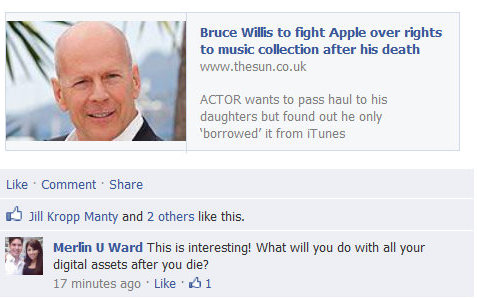According to an article in The Sun, Bruce Willis intends to leave his music collection to his kids after his death, however, the article reports, according to their interpretation of the user agreement even though you pay for the music, the music is for the purchaser’s personal use, they are not selling it to you. So, you do not own it. As a result, Bruce Willis would have a problem – you can’t leave something you don’t own to your kids!

What are we all doing? Are we all downloading and paying for apps, books, music, etc. – yet none of us own any of it?! Surely every site that you “purchase” things from has a user agreement. How many of us are reading the small print and are we even understanding what it means? When I posted the link to the article on my Facebook Page, my friend Merlin U Ward wrote: “What will you do with your digital assets when you die?” Great question, but even more so is the question of what exactly are our digital assets? Do we have any? If the information in this article is correct, then it could be argued that it’s not an investment, and the “purchases” may actually just be loaners. It is definitely something to investigate and learn more about. How much are you spending on digital downloads? An even greater question, how would any company enforce this?
Do You Read Your User Agreements?
I speculate that this all came up because Bruce Willis was doing some planning and in making sure he was dotting all his “i”‘s , checked the agreement.
How many people actually read their user agreements? Most of us aren’t looking for this information as we download things, or even sign up for social media sites.
Every site has it’s own user agreement, perhaps this is a good opportunity to spend some time to understand what it is we are si gning on for as we purchase things, or invest in accounts.
gning on for as we purchase things, or invest in accounts.
What about Social Sites? What Happens there?
This is a great article that gives and overview of what happens to your Facebook page after you die What happens to all my social networking information when I die? . I was pleased to learn that Facebook takes the time to actually give some very considerate options to the user’s family in such a sad and difficult time. They apparently can leave the page as is, or, at the request of the family can turn it into a memorial site. I think that’s pretty “human” of them.
This CNET article from 2010 covers how the Facebook and Twitter policies compare. I am happy to see both provide opportunity for the memorial concept. We invest so much into our social media activity, it’s nice to know it won’t all get wiped away in a flash.
So in the end, is it about you?
The big question is, what do you want to happen with your sites years down the line? Some people might want their entire sites taken down, others may want to keep things up so others could continue the connections. Circumstance certainly would play a role.
What would you do?
Would you leave your sites up so those you cared about could continue to honor and celebrate your life? Sharing stories together “In Memoriam” on your original page?
What if what you want is not what your family would want? How do these things get decided?
Interestingly there are services emerging to respond to this very thing, among them are Legacy Locker which offers free and paid plans, and Secure Safe, which offers a “Data Inheritance” service.
We have a lot to manage and think about when it comes to our evolving commitment to using social media, the information we share online, the investment of our time, and in Bruce Willis’ case even the investment into “buying” and building a music collection.
What do you think of this? The responsibility is on us as users to understand what we are signing on for. In the case of the downloaded music, I think it’s just the tip of the iceberg… and Bruce Willis is going to take it on for us.
Related : CBC News Related post

This is really good information Mila. I never thought of it but it sure is worth looking into now. Thank you for this!
DIS4Business Thank you for commenting Doina 🙂 I think it was a good story to shed some light on the fact that we really don’t pay that much attention to what we download anymore. We have become numb to these user agreements, and overall just think because it’s what everyone is doing , it makes sense. A few months ago I bought a few books on paper because i wanted to authors to be able to sign something. I already had them on digital. I remember thinking, this is crazy, why would we keep buying paper other than to have the authors signatures… well, the idea that I might not own what I buy, but may only be leasing it is a little disturbing, especially when you start to amass collections. It was a good article to trigger a lot of different thoughts. Im glad you found it useful too 🙂
Milaspage Reminds me of that South Park episode that I didn’t like. In general I like South Park but this one was kind of disgusting. They were making fun of Steve Jobs as well which was unfortunate especially given the timing of the episode. But it had to do with punishment for not reading the “user agreement”.
Interesting research, Mila. I can bet that most of us do not read the fine print of user agreements. I will be intrigued with the outcome of the Bruce Willis rights to his music collection. I would have made the same assumption. Ownership should be transferable as long as it isn’t duplicated.I did not know that Facebook would turn your page into a Memorial site, but I’m still coming to grips with that particular digital property outliving me…